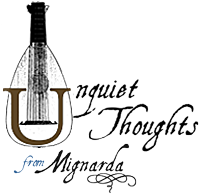New Saturday morning quotes : A Better Ditty

What is a ditty? To denizens of the early 20th century, the term refers to a bag or box (illustrated above) in which necessaries or treasures are stored. To those involved in the modern music industry, it can refer to a person who specializes in angry, debasing, or otherwise insulting poetry set to industrial noise, having taken on a variant of the term.
In music, a ditty can mean either a simple tune, or otherwise to simple words sung to a simple tune. To those of us who spend most of our time buried in the context and details of ancient music, in historical usage a ditty referred to a sung poem or the lyrics to a song.
… , dittie , dictie , etc. (Lat. dictum, dict , a saying) . In ME, ditty denoted a composition or treatise and then a piece of verse; by the 16th c., it had come to mean the words of a song. As a verb, ditty could mean to sing a song or to set words to music—now obsolete. In Thomas Morley ’s Plaine and Easie Introduction to Practical Musicke ( 1597 ), the section on how to fit music to a text is titled “Rules to be Observed in Dittying,” and Samuel Daniel in A Defence of Ryme ( 1603 ) remarks that feminine rhymes are “fittest for Ditties.”
– Edward Doughtie, The Princeton Encyclopedia of Poetry and Poetics (4 ed.)
We encounter the term in John Dowland’s Second Booke of Songs or Ayres (1600), where in the table of contents, the twentieth song is titled, “Finding in fields my Siluia all alone.” But turning to the correct page, we find a note “for Finding in fields : ye shall finde a better dittie.” The Second Booke was printed in London by Thomas Este while Dowland was serving at the court of Danish king Christian IV, hence Dowland’s Dedication, “From Helsingnoure in Denmarke the first of Iune. 1600.” Did Dowland decide on a “better dittie” or did the printer decide he had seen enough drivel concerning nymphs and shepherds, making the substitution on his own initiative?
As 21st-century artists, we are accustomed to having very little control over the disposition of our music, with streaming platforms taking the lion’s share of profits (we typically get $0.0004 per stream). But in 1600 it may have been even worse. Dowland sold the rights of his songbook to the printer, at which point he no longer had control over the contents, nor did he receive royalties from sales. If Thomas Este made the substitution, he was complicit in the creation of “Tosse not my soule,” one of Dowland’s best songs, with suitably melancholy lyrics and full of counterpoint and biting dissonance. It was still Dowland’s music, but thank you Thomas Este.
The good news is that you will soon be able to hear our interpretation of the “better dittie” as we are just now finalizing our new album, The delight of solitariness, Lute songs and solos of John Dowland. We have chosen a program consisting of some of Dowland’s lesser-known songs, and we’re pleased with the result. Watch this space.
